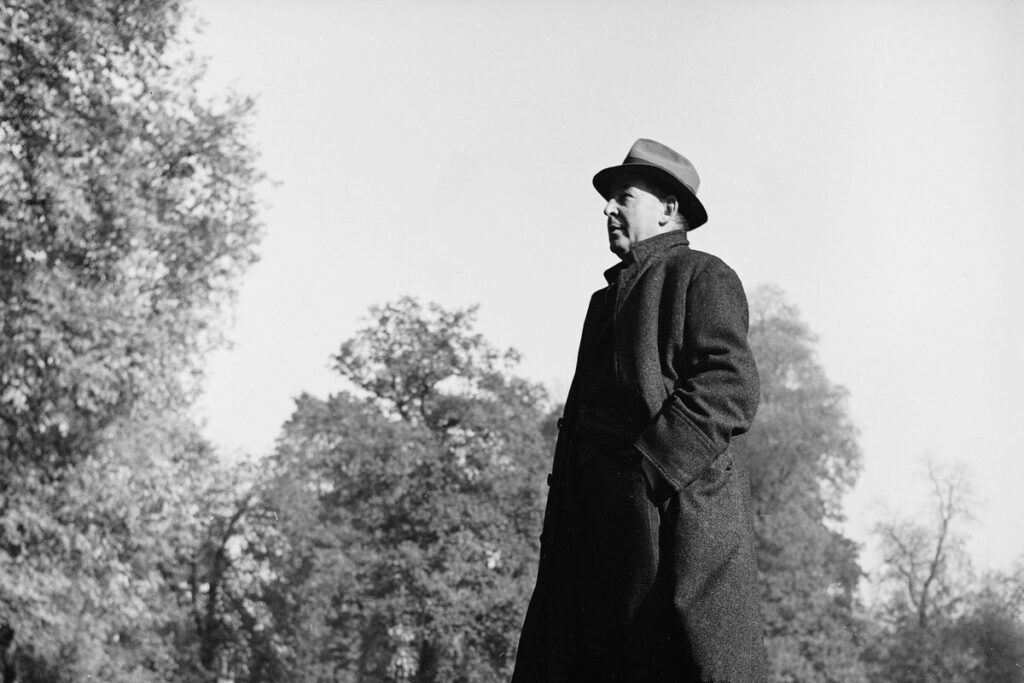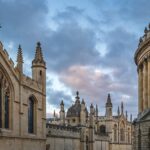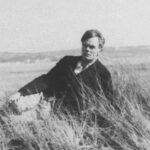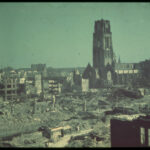Blog Post
The last days of C.S. Lewis
By Jonathon Van Maren
Douglas Gresham remembers the day he first met C.S. Lewis vividly. He had just arrived in England with his mother and his brother, and Lewis had invited them to come and stay with him for a few days at the Kilns. It was a frosty December day, and he was filled with anticipation. He was about to meet the professor of the manor, the creator of Narnia, a man who was surely filled with magic.
“I remember walking through the back porch of the kitchen door,” Gresham told me. “As we walked in, Jack appeared from the other side of the kitchen. He was perhaps the most shabby-looking individual I’d ever seen in my life. As far as I was concerned, this was a man on speaking terms with High King Peter and Aslan, and he looked completely scruffy; there was nothing particularly handsome about him; he was balding; he wore clothes that were almost falling apart; he had slippers on with his heel crushing the heel of the slipper; and he had long, nicotine-stained teeth and fingers. He was a mess, quite frankly.”
That first impression, however, quickly wore off. “There was also a glow of friendship about him,” Gresham recalled. “Within about five minutes, the way he approached me and talked to me and the way we had a conversation going completely eradicated any misgivings I might have had about the man. I lost an idol and gained a friend very quickly. For me, it was very simple. This was a man who was obviously fond of my mother and was going to be fond of me. He and his brother Warnie were just wonderful, wonderful people.”
Gresham’s mother, of course, was Joy Davidman, the woman who would become C.S. Lewis’s wife–thus making Douglas and David Gresham Jack’s stepsons. Gresham’s memoir Lenten Lands: My Childhood with Joy Davidman and C.S. Lewis is a poignant and powerful book, but at the time of publication (it was released in 1988), Gresham left many details out. As I detailed in an article in First Things, he is only now discussing the fact that his brother David was a violent paranoid schizophrenic, a fact that had a tremendous impact on his childhood and on the final years of Lewis’s life. But there are other stories he is now beginning to tell, as well.
The road to Jack’s doorstep was a fraught one for Douglas. Gresham’s father William was a well-known author who suffered tremendously from his experiences during the Spanish Civil War. “Having gone over there and volunteered to fight, he came back [to America] with bad cases of alcoholism and PTSD,” Gresham told me. “He was a very heavy smoker as well, which eventually killed him. I loved him dearly, but he could roar with rage around the house and shout and it was very frightening for a small boy.”
While Joy was in England searching for a publisher for her book Smoke on the Mountain, William fell in love with her first cousin, Renee Rodriguez. The marriage, which had already been on the rocks, fell apart. Davidman took the two boys and headed back to England. William stayed behind with Renee, eventually moving to Florida.

To Gresham’s mind, the union that formed between his mother and C.S. Lewis was inevitable. After writing back and forth for awhile, Joy first met Jack in person during that first trip to England. Right from the start, Gresham told me, they “found themselves face to face with someone of their own kind. There aren’t too many of those in the world.” According to Gresham (who approves of one of the most recent books about his mother, Patti Henry’s Becoming Mrs. Lewis), their relationship is almost always mischaracterized by those seeking to malign his mother’s reputation.
“Many people think she set out to trap C.S. Lewis,” he told me. “Well, getting cancer and dying is not a very good way of doing that. That’s nonsense. What happened was simple. Jack and my mother came together and found each other to be the only person each of them had ever met that was on their level. I’ve not known anyone since who was on that level, to be honest. I’ve met some very bright, very intelligent, and very wonderful people—but nobody who stood up to Jack and my mother.”
“They grew closer and closer and time went by,” he went on, “and when Jack found that she was in difficulties financially, he would help. People mistake that as being specifically for my mother. Jack helped anybody who was in financial difficulty. I was once delivering a lecture in America, and I was talking about Jack doing this sort of thing even if he couldn’t afford it. Someone in the crowd stood up and waved his hand. I think he was Egyptian, and he’d been sent over to England as a student at Oxford, studying medicine.” For some reason, his financing dried up. Someone told Lewis about this, and the next morning, the young man found a very large cheque had been pushed under his door. The money kept coming in until he completed medical school. “He stood up, and he was weeping when he finished,” Gresham recalled. “That was what Jack did.”
As early as 1955, Gresham says, he saw Jack brighten up in his mother’s presence and his mother thrive whenever she was around Lewis. He believes Jack already loved her then, although Lewis probably would not have been able to correctly identify the sentiments. In 1956, when the British government decided not to renew Joy’s visa—Gresham suspects it had something to do with deteriorating British-American relations in the wake of the Suez crisis—Lewis decided to marry her to keep her in the country. A small, civil ceremony took place in the registry office on April 23. Even Warnie was told that the marriage was one of convenience, and that they would continue to live apart (three miles down the road from one another). It was, Gresham told me, “a secret and private and not-Christian marriage.”
The love between Jack and Joy continued to grow, and the secret “unmarriage,” Gresham says, rapidly grew into a real thing in the minds of the participants. Preparations were made to move into the Kilns in the summer of 1956, although a physical relationship was still forbidden—and Joy Davidman was beginning to complain about pain in her hip. That autumn, the boys were called home from their fall term because their mother had broken her leg. In truth, Gresham recalled, “she had broken her leg—but she’d broken it because the cancer had eaten the bone.” At the hospital, Jack struggled to tell the boys that their mother had cancer and was probably dying. The boys were stunned. During our conversation, I realized that Gresham was sharing the story of his mother’s first cancer diagnosis with much more detail than he had recorded it in Lenten Lands.
“David had been told to show me the way back to the Kilns from the hospital, but as soon as we got onto the road he just ran away as fast as he could,” Gresham told me. “I was just ten years old and had no idea how to get back to the house. I started out on what I thought was the right way, and came to a path that I recognized that led from the road through the churchyard of Holy Trinity Church to Headington quarry. I walked to the end of the pathway and lifted the wrought-iron gate that led into the churchyard, and I stepped out of this world. I stepped into a place that was hugely more alive—more alive than I felt, to be honest. The leaves on each tree glowed with an inner light of their own. The grass did the same thing. It’s almost impossible to describe. I was not in this world, because there was this huge and powerful presence in that place. His presence had caused it all to glow the way it was.”
“I was only a small boy,” Gresham went on. “A voice, that was not audible by ears but came into my mind, said: If you really can’t live without your mother, I can fix it. All you have to do is ask. I went inside the church—this was before they had to lock churches—and I knelt at the altar and I prayed with every fibre of my little boy being that my mother would be allowed to live, because I really didn’t know anybody at that stage but her. He said: It’s fixed. Go home. Be at peace. He also told me at that time not to tell anybody, although I’m not sure why. So I walked on through this amazingly bright and brilliant place, glowing with all of its inner lights—even the trees were aglow—until I reached the churchyard gate on the other side that led out. I opened the latch, and stepped out into this shabby, shoddy world in which we live. My mother went into remission two nights later.”
Despite opposition from his friends and the Church of England, Jack persuaded his friend Peter Bide to marry them at Joy’s bedside, with Warnie and the nurse witnessing the marriage. “Jack and my mother were legally, even by the Church, married,” Gresham recalled. “The archbishop of Oxford summoned Peter in and blew his stack. After he’d given him a strict lecture about what the Church says and what he had a right to do and didn’t have a right to do, he finally smiled and said: ‘But I’m very glad you did it.’ It was a marriage that lasted until my mother died.”
At this point, Lewis still believed his new bride was dying. “When the hospitals said they could do no more for her, he was not going to let her go back into the rental house,” Gresham told me. “They put a hospital bed in what had been the sitting room at the Kilns and that became her place for the next months. She slowly recovered. She started recovering that night that I prayed, and she just got better and better. She actually lived for four more years, and Jack and my mother had the finest times of either of their lives during those four years. Eventually, the cancer started to renew itself and I was sent home from school in Wales to say goodbye to my mother. I went to the hospital again, and walking back through the same church yard, the same huge brilliance erupted in that place.”
“I was fourteen by this stage—not a little boy anymore. He said: If you need me to do this, I can fix it again. And I thought to myself: Asking for the same miracle twice would probably be a greedy thing to do, and my mother had gone through enough agony the first time. So I said: Thy will be done. I walked out, and she died two days later.”
But before she died, Jack and Joy had a precious reprieve. She became the physical and spiritual core of the Lewis household, rallying everyone from their sorrow with her bravery. A woman’s touch was needed for the filthy bachelor pad that was the Kilns, much corroded by Jack and Warnie’s shared conviction that cigarette ash was good for carpet because “it keeps out moths.” The house was in such bad condition that Douglas was nearly killed while reading a book on his bed when a section of the ceiling caved in. The Kilns was suddenly assaulted by tradesmen of every sort. The gardens were restored, the greenhouse rebuilt. Mrs. Lewis had risen from her deathbed, and now the Kilns came back to life around her.
She also launched a campaign to drive the obscene and rowdy trespassers out of the private park adjoining the  Kilns. At one point, this involved Mrs. Lewis wielding a shotgun and kindly requesting that Jack, who had stepped between her and an intruder wielding a bow and arrow, “get out of my line of fire.” The family took seaside vacations, and Douglas became fast friends with the gardener, Fred Paxton (the inspiration for Puddleglum.) Douglas and Jack got on famously: “He always claimed he wasn’t good with children, but he was very good with them. In our case he was as good as he could possibly be. He supported us in everything we could do. When I did something stupid, I would be told off. I never had to be punished, I don’t think, but I was scolded once or twice.”
Kilns. At one point, this involved Mrs. Lewis wielding a shotgun and kindly requesting that Jack, who had stepped between her and an intruder wielding a bow and arrow, “get out of my line of fire.” The family took seaside vacations, and Douglas became fast friends with the gardener, Fred Paxton (the inspiration for Puddleglum.) Douglas and Jack got on famously: “He always claimed he wasn’t good with children, but he was very good with them. In our case he was as good as he could possibly be. He supported us in everything we could do. When I did something stupid, I would be told off. I never had to be punished, I don’t think, but I was scolded once or twice.”
Indeed, there is still much that Gresham could tell us about the last years of Lewis’s life if he decides to expand on his previous memoir some day—including the identities of those who came to Lewis for solace and advice, whom he often escorted up to Lewis’s office. “Many, many years ago now, a man who was a member of the Royal Family of England, a very important one, showed up driving his own car, an enormous, beautiful machine that I envied,” Gresham recalled. “He came in and spent time with Jack, and I think he went away feeling a great deal better. I don’t know what his problem was—I won’t mention his name, but I know who he was—and I don’t know if Jack solved the problem for the man, but he certainly helped him understand it. He was a very fine man, came a couple of times actually. I liked him very much.”
In 1959, Joy’s cancer came back. “Jack, Warnie, and I began to avoid each other’s eyes for fear of seeing each other’s fear,” Gresham wrote in Lenten Lands. She died on July 13, 1960, and Douglas returned to the Kilns from school for the funeral. “I walked into the house through the front door, and on the left, the first door you come to, is what’s known as the sitting room,” he told me. “I opened the door, and it was just a shock. Jack, who I’d seen a week or two earlier, had shriveled into a small, desperate man. He was standing with his left hand on the mantlepiece. I just looked and him and said ‘Hello, Jack’ and burst into floods of tears. He came rushing across and held me in his arms. We just stood there and wept together for five, perhaps ten minutes. Finally I said, ‘Jack, what are we going to do?’ Jack said: ‘Well, I suppose we just have to carry on, Doug.’ And that’s what we set out to do.”
After that, Gresham says, Lewis was never truly happy. Many have said that he was happy at Cambridge after Joy’s death, but Gresham disagrees. As a young boy, he notes, he saw things that most did not: How Jack would sag against the door after his friends departed after a dinner of wit and conversation; how he would hide his despondency even from Warnie, who was slowly losing his battle against alcoholism. Gresham says he has read much by those who say they knew Jack well—but that many of them did not fully realize that after Joy’s death, he held everyone at a distance. He suffered tremendously in those last three years of his life, and Gresham regrets that he did not do more for Jack and Warnie in the last year of Jack’s life, when his health was declining and he desperately worried about Warnie’s drinking, which was flaring up in large part due to concerns about Jack’s health.
Jack died on November 22, 1963—the same day that Aldous Huxley departed and John F. Kennedy was shot. Gresham remembers standing outside and looking up on the dark night he heard the news and being grateful for the rain as it mingled with his tears. He was 18 years old and utterly orphaned. His mother was gone, his stepfather was gone, and his father William had killed himself the year before after being diagnosed with cancer. “It hurts on many fields of emotion,” he recalled. “Sometimes you feel you’ve been neglected, tossed aside, and that’s not the case at all. That’s the enemy of God trying to make us feel that it’s God’s fault. I’ve never really thought about what it’s like to have everyone die off on you, except that it hurts like hell.”
Just before Jack died, J.R.R. Tolkien offered to take Gresham in. He actually met Douglas as he was leaving the hospital and stopped him on the road: “Douglas, you won’t remember me. I just want you to know that if you have nowhere to go, you can come and live with us.” Gresham, of course, remembered Tolkien well. “I had been at Inklings meetings when I was quite small,” he told me. “For some reason there was no one at home to look after me and Jack was going off to a midday Inklings meeting at a pub, and I would go along with him. I would be given half a pint of draft bitter beer—I was probably only twelve at the time—and I would go off and play games in the backyard of the pub. When their meeting was all over and they were bidding each other farewell, I’d come in and we’d go home.” Gresham says he always regretted not becoming friends with Christopher Tolkien, who he met a few times but never developed a relationship with.
Meanwhile, Gresham moved in with his mother’s friend, the journalist Jean Wakeman. He enrolled in agricultural school and began to work on a large farm in Somerset. It was there that he would meet the girl of his dreams—quite literally. Because his brother David had been a violent schizophrenic, Douglas had spent much time running away and playing alone. This got lonely, and so he invented a little girl in his mind—an imaginary friend—that he would play with. As he got older, the girl grew older in his mind. By the time he was eighteen, and the girl in his mind was around the same age, he harbored a private desire to meet and marry her. He knew just how she’d look, and behave, and sound. After all those years, she was quite real to him.
One day, the family he was staying with in Somerset sent him off to pick up their niece at the train station with Harry, her cousin. The two young men were standing on the train platform when it happened. “I saw the girl I’d been looking for since I was six years old,” he told me. “I said to Harry: You see that girl over there? The one with the long blond pigtail? She’s the girl I’m going to marry. He said: Don’t be so stupid. That’s my cousin. Within two or three days, I’d fallen completely in love with her, and decided to marry her. It took me three years and several proposals, but she finally said yes. We’ve been together for 57 years and married for over fifty of them.” Together, they bought a farm in Tasmania and had three children. One is farming in New South Wales, the second is a medical distributor, and the third is an architect in Brisbane.
Gresham eventually sold the farm, worked in radio in television, and ran a pro-life ministry in Ireland for a time. He now works with the C.S. Lewis estate on the Narnia films and other projects, while living with his wife Merrie Gresham in Malta. “I’ve had a weird life in many ways, I suppose,” he told me. “But it’s also been an enormously enjoyable one. There have been great sadnesses, there have been great difficulties. But I’ve loved nearly every minute of it.”
***
Listen to my conversation with Douglas Gresham here:









Thank you for sharing so much of Doug Gresham’s real life. As I had come to know him, because of my husband’s, collecting first editions of Lewis works , I came to really know Doug through your well written memories.
Thank you very much,
Mrs. Edwin Brown